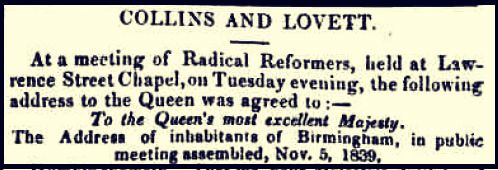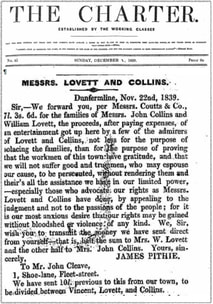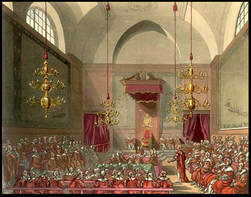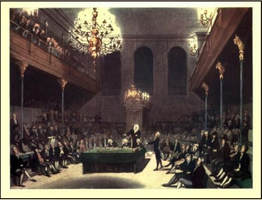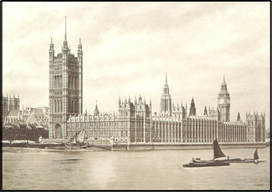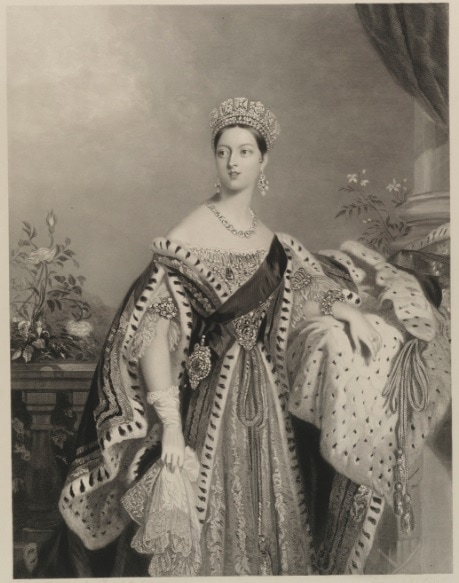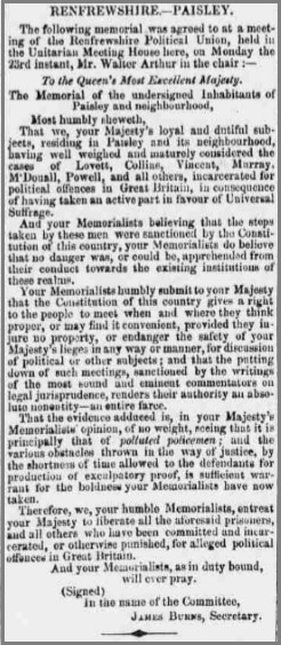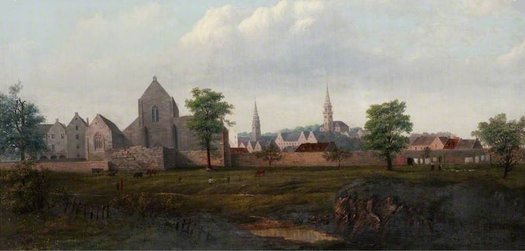PROTESTS & DEBATES AGAINST PRISON TREATMENT
|
Whilst held on bail, and during their twelve months' prison term in Warwick Gaol, John Collins and William Lovett suffered grave mistreatment.
To no avail they - and others on their behalf - wrote to government and prison officials, even The Queen, requesting better treatment and conditions. Scroll down for petitions addressed to Queen Victoria. Click here for Collins' & Lovett's own petitions. |
|
Such correspondence was featured in newspapers across the country, and became the subject of much debate in Parliament.
(Hansard 18th century). (http://hansard.millbanksystems.com/search/collins+lovett). A Defense Fund was organized in London, and in Birmingham a committee was set up for collecting donations and subscriptions in support of John Collins and his family. It met every Thursday at the Cross Guns, Lancaster Street, Birmingham. Visiting reformers were invited to stop off if they passed through Birmingham, and the likes of Harney, Carlisle, Ayr and Cardo attended. |
LONDON RADICAL CLUB
The members of the London Radical Club were supporters of Universal Suffrage. On 31st October 1839 they passed a resolution "very properly condemning the conduct of Govt towards Lovett and Collins" which was published in various newspapers.
|
"At a Meeting of this Club, held at Radley's Hotel, on Thursday, the 31st day of October, 1839, it was unanimously Resolved--
"That this Club is desirous of marking the strong feeling of abhorrence and disgust with which it regards the cruelties practised by the Magistrates of Warwickshire, and sanctioned by the late Home Secretary, Lord John Russell, towards Mr Lovett and Mr Collins, sentenced to imprisonment for an alleged political offence. And that this Club determines to promote a subscription for the subsistence of the family of Mr Lovett, a member of the Club, during the time of his imprisonment. "That these resolutions be advertised in the Morning Chronicle, the Sun, Weekly True Sun, and the Birmingham Journal. "That Mr Harrison, Treasurer of the Club, be appointed to receive the Subscriptions, at Radley's Hotel, Bridge Street, Blackfriars, or No. 4, Cumberland place, Grove lane, Camberwell. "R. G. Welford, Chairman" (112. Place Collection, set 56, vol 6 Sept-Nov 1839, f.213) |
GOVERNMENT DEBATES
Collins & Lovett Petition the Government
When Lord Brougham presented Collins' and Lovett's first petition to the House of Lords on 18th July 1839 he said the prisoners' treatment while held on bail in Warwick Gaol was " the most shameful he had ever heard of." However, there was little sympathy to be had in that privileged upper House, and some of its members laughed outright at the plight of the prisoners! House of Lords Debate 18 July 1839 vol 49 cc437-70
(http://hansard.millbanksystems.com/lords/1839/jul/18/messrs-lovett-and-collins-riots-at#S3V0049P0_18390718_HOL_11)
When Lord Brougham presented Collins' and Lovett's first petition to the House of Lords on 18th July 1839 he said the prisoners' treatment while held on bail in Warwick Gaol was " the most shameful he had ever heard of." However, there was little sympathy to be had in that privileged upper House, and some of its members laughed outright at the plight of the prisoners! House of Lords Debate 18 July 1839 vol 49 cc437-70
(http://hansard.millbanksystems.com/lords/1839/jul/18/messrs-lovett-and-collins-riots-at#S3V0049P0_18390718_HOL_11)
At a parliamentary debate for money for Birmingham to have its own police force, Mr W Williams MP thought that "the late excitement (rioting on 15th July) in Birmingham had been caused by the most unjust, most unwarranted, and most gross treatment of Messrs. Lovett and Collins. But for that treatment he thought that no disturbance would have occured."
House of Commons Debate 23 July 1839 vol 49 cc691-707
(http://hansard.millbanksystems.com/commons/1839/jul/23/birmingham-police)
Warwick Magistrates - Charges of Misconduct
In a House of Commons debate Mr Hawes MP said "The petitioners had been subjected to avoidable severities which were not justified by the Gaol Act, and therefore the Warwickshire Magistrates were justly amenable to censure." Not surprisingly, the Earl of Warwick defended the conduct of said Warwickshire Magistrates, and presented a report from them and prison officials refuting claims of ill-treatment. House of Commons Debate 30th July 1839 vol 49 cc976-87. (http://hansard.millbanksystems.com/lords/1839/jul/30/messrs-lovett-and-collins-warwick-gaol#column_976) .
Mr J S Leader MP contended the Magistrates' rebuttal of the prisoners' allegations "so far from contradicting, confirmed the statements in it." House of Commons Debate 2 August 1839 vol 49 cc1188-92
(http://hansard.millbanksystems.com/commons/1839/aug/02/messrs-lovett-and-collins)
As it turned out, the Magistrates had been deceitful (for which Collins publicly denounced them on his release from prison). The Magistrates had published a misleading dietary table that stated the prisoners received half a pound (8oz or 236g) of meat twice a week, whereas they had gone without solid meat for almost six months except for a vile and unpalatable soup said to contain 4oz of "soluable" meat twice a week (Northern Star 8 Aug 1840).
Preferential Treatment for other Prisoners
As late as April 1840 debate in the capital still continued regarding Collins' and Lovett's disgraceful treatment. Mr Henry Warburton MP submitted a motion "in reference to Messrs, Lovett and Collins, parties who were convicted of seditious libels at Warwick. The sedition was published by them after the riot that took place at Birmingham. In former times, when parties were found guilty of seditious libels, it was considered quite sufficient to make provision for the safe detention of the persons found guilty, but nothing in the shape of punishment, or of a penitentiary was ever considered necessary. He might refer to almost innumerable instances of that kind."
Warburton then cited past cases of eminent individuals imprisoned for similar offences who received special treatment. In the same debate Mr Thomas Dunscombe MP pointedly asked Lord John Russell the Home Secretary to answer the question why other Chartist prisoners imprisoned for similar offences were currently being treated much better than Lovett and Collins who had to sleep with felons in the same narrow bed. He cited Stevens in Lancaster Gaol, who had access to the governor's apartments and unrestricted visitors.
House of Commons Debate 14 April 1840
http://hansard.millbanksystems.com/commons/1840/apr/14/lovett-and-collins#S3V0053P0_18400414_HOC_29
House of Commons Debate 23 July 1839 vol 49 cc691-707
(http://hansard.millbanksystems.com/commons/1839/jul/23/birmingham-police)
Warwick Magistrates - Charges of Misconduct
In a House of Commons debate Mr Hawes MP said "The petitioners had been subjected to avoidable severities which were not justified by the Gaol Act, and therefore the Warwickshire Magistrates were justly amenable to censure." Not surprisingly, the Earl of Warwick defended the conduct of said Warwickshire Magistrates, and presented a report from them and prison officials refuting claims of ill-treatment. House of Commons Debate 30th July 1839 vol 49 cc976-87. (http://hansard.millbanksystems.com/lords/1839/jul/30/messrs-lovett-and-collins-warwick-gaol#column_976) .
Mr J S Leader MP contended the Magistrates' rebuttal of the prisoners' allegations "so far from contradicting, confirmed the statements in it." House of Commons Debate 2 August 1839 vol 49 cc1188-92
(http://hansard.millbanksystems.com/commons/1839/aug/02/messrs-lovett-and-collins)
As it turned out, the Magistrates had been deceitful (for which Collins publicly denounced them on his release from prison). The Magistrates had published a misleading dietary table that stated the prisoners received half a pound (8oz or 236g) of meat twice a week, whereas they had gone without solid meat for almost six months except for a vile and unpalatable soup said to contain 4oz of "soluable" meat twice a week (Northern Star 8 Aug 1840).
Preferential Treatment for other Prisoners
As late as April 1840 debate in the capital still continued regarding Collins' and Lovett's disgraceful treatment. Mr Henry Warburton MP submitted a motion "in reference to Messrs, Lovett and Collins, parties who were convicted of seditious libels at Warwick. The sedition was published by them after the riot that took place at Birmingham. In former times, when parties were found guilty of seditious libels, it was considered quite sufficient to make provision for the safe detention of the persons found guilty, but nothing in the shape of punishment, or of a penitentiary was ever considered necessary. He might refer to almost innumerable instances of that kind."
Warburton then cited past cases of eminent individuals imprisoned for similar offences who received special treatment. In the same debate Mr Thomas Dunscombe MP pointedly asked Lord John Russell the Home Secretary to answer the question why other Chartist prisoners imprisoned for similar offences were currently being treated much better than Lovett and Collins who had to sleep with felons in the same narrow bed. He cited Stevens in Lancaster Gaol, who had access to the governor's apartments and unrestricted visitors.
House of Commons Debate 14 April 1840
http://hansard.millbanksystems.com/commons/1840/apr/14/lovett-and-collins#S3V0053P0_18400414_HOC_29
GOVERNMENT PAPER ORDERED BY PARLIAMENT
MEMORIALS & CORRESPONDENCE - HIGHLIGHTS
Over the course of several months the government received numerous appeals relating to Collins' and Lovett's confinement in Warwick Gaol. On 4 February 1840 Parliament ordered memorials and correspondence on the subject to be printed in a sixteen page document. The following highlights some of those.
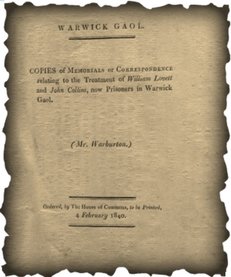
Pages 1 and 2 contain a letter and memorial from Collins and Lovett to Lord John Russell (Home Secretary) dated 20 August 1839. They give great insight into prison conditions at that time, and ask to be transferred from the Felons side to the Debtors side of Warwick Gaol.
Page 5 includes a letter and petition to Lord Normanby, "Her Majesty's Principal Secretary of State for the Home Department," sent by Joshua Scholefield, Member of Parliament for Birmingham, on behalf of the "numerous friends" of John Collins. The petition is signed by borough magistrates, town councilors, and business men.
Page 8 includes a memorial from the London Working Men's Association, requesting the two prisoners be moved from the Felons Prison to the Debtors Prison (offering better food and treatment) or failing that requesting the men be permitted to use their own money to buy decent food.
Pages 13 and 14 contain a letter from Sir Eardley Wilmott Member of Parliament for Coventry. Coventry was one of the towns that elected Collins to serve as their Delegate at the National Convention in London.
Page 5 includes a letter and petition to Lord Normanby, "Her Majesty's Principal Secretary of State for the Home Department," sent by Joshua Scholefield, Member of Parliament for Birmingham, on behalf of the "numerous friends" of John Collins. The petition is signed by borough magistrates, town councilors, and business men.
Page 8 includes a memorial from the London Working Men's Association, requesting the two prisoners be moved from the Felons Prison to the Debtors Prison (offering better food and treatment) or failing that requesting the men be permitted to use their own money to buy decent food.
Pages 13 and 14 contain a letter from Sir Eardley Wilmott Member of Parliament for Coventry. Coventry was one of the towns that elected Collins to serve as their Delegate at the National Convention in London.
MEMORIALS & CORRESPONDENCE - SLIDE SHOW
Please click on the slide show below for a complete view of the government ordered paper. You may also read a transcription of the document by clicking here.
|
|
Government ordered Paper dated 4 February 1840
Relating to the Confinement of William Lovett & John Collins in Warwick Gaol
Courtesy the Library of Birmingham, Warwickshire, England
Relating to the Confinement of William Lovett & John Collins in Warwick Gaol
Courtesy the Library of Birmingham, Warwickshire, England
FRANCIS PLACE TO SIR JOHN E EARDLEY WILMOT
A narrative by Francis Place to Sir John E Eardley Willmot tells of the government delays, failure to respond, and refusal to order improvements to the prisoners' treatment.
"On the commitment of Lovett and Collins, after their conviction, to the criminal side of the gaol at Warwick, two members of the House of Commons, Mr Joseph Parkes and myself, took such means as we thought were likely to induce Lord John Russell [Home Secretary] to cause the prisoners to be removed to the debtors' side of the prison, where persons convicted of seditious libels had on all former occasions been confined. Our applications, which were several, were useless.
"At this time both the prisoners were, in consequence of the sudden change of diet, in the infirmary. Application was therefore made and urgently pressed upon the attention of Lord John respecting the state of the prisoners, and the previous delicate state of health of William Lovett, his immediate friends having concluded that his life was in danger, and Lord John was earnestly solicited to cause both men to be allowed, at their own expense a change of diet; but it was not until after much time had passed that the accommodation which you, sir, have witnessed was allowed.
"To most respectable, and, I may add, reasonable application for further accommodation tending to preserve the health of the prisoners, his lordship at length replied, by the hand of Mr Phillips, 'that his lordship does not consider that he has the power to order them to be transferred to the debtors' side of the prison.' "
STARVATION DIET
Mr Place goes on to tell how appeals made on behalf the prisoners by Member of Parliament Thomas Duncombe, came to nothing. Place says Mrs Lovett's pleas for help were ignored, as were a Dr Black's report that Collins' health and appearance had changed for the worse. In spite of both men having been sick in the infirmary and the numerous appeals for better food for the prisoners, Lord Normanby (who took Lord Russell's place as Home Secretary) wrote in December 1839 that "an increase of diet is not called for at present." At that point, five months into the prisoners' sentence, their diet consisted bread and potatoes, tea and water.
"On the commitment of Lovett and Collins, after their conviction, to the criminal side of the gaol at Warwick, two members of the House of Commons, Mr Joseph Parkes and myself, took such means as we thought were likely to induce Lord John Russell [Home Secretary] to cause the prisoners to be removed to the debtors' side of the prison, where persons convicted of seditious libels had on all former occasions been confined. Our applications, which were several, were useless.
"At this time both the prisoners were, in consequence of the sudden change of diet, in the infirmary. Application was therefore made and urgently pressed upon the attention of Lord John respecting the state of the prisoners, and the previous delicate state of health of William Lovett, his immediate friends having concluded that his life was in danger, and Lord John was earnestly solicited to cause both men to be allowed, at their own expense a change of diet; but it was not until after much time had passed that the accommodation which you, sir, have witnessed was allowed.
"To most respectable, and, I may add, reasonable application for further accommodation tending to preserve the health of the prisoners, his lordship at length replied, by the hand of Mr Phillips, 'that his lordship does not consider that he has the power to order them to be transferred to the debtors' side of the prison.' "
STARVATION DIET
Mr Place goes on to tell how appeals made on behalf the prisoners by Member of Parliament Thomas Duncombe, came to nothing. Place says Mrs Lovett's pleas for help were ignored, as were a Dr Black's report that Collins' health and appearance had changed for the worse. In spite of both men having been sick in the infirmary and the numerous appeals for better food for the prisoners, Lord Normanby (who took Lord Russell's place as Home Secretary) wrote in December 1839 that "an increase of diet is not called for at present." At that point, five months into the prisoners' sentence, their diet consisted bread and potatoes, tea and water.
PETITIONS TO QUEEN VICTORIA
1. FROM THE PEOPLE OF BIRMINGHAM TO THE QUEEN
At a public meeting of radical reformers on 5 November 1839 in Birmingham, the following address was approved and sent to Queen Victoria. Needless to say it had no effect.
At a public meeting of radical reformers on 5 November 1839 in Birmingham, the following address was approved and sent to Queen Victoria. Needless to say it had no effect.
|
King William IV died on June 20th 1837 and Victoria became queen at the age of 18. She was crowned at Westminister Abbey on 28th June 1838 just as Chartism was in its ascendancy. Lord Melbourne was the prime minster at that time. She reigned 23,226 days, 16 hours and 23 minutes.
In December 2007 Queen Elizabeth II bypassed her 3rd great grandmother Queen Victoria as the oldest British reigning monarch. On September 9, 2015 Queen Elizabeth II again bypassed Queen Victoria to become the longest-serving British monarch ever. |
To the Queen's most excellent Majesty.
The Address of inhabitants of Birmingham, in a public meeting assembled, November 5th 1839. Humbly showeth - That we, your Majesty's dutiful and loyal subjects, deeply impressed with the necessity of your Majesty having a conscientious regard for the rights and privileges of your people, do, with submission, approach your Majesty's throne in behalf of Messrs. Collins and Lovett, now suffering in gaol for having taken an active part in the present movement for the extension of the elective franchise to your Majesty's subjects. That those individuals have all along borne an unimpeachable and good moral character, and have been distinguished from numerous others, by their reprobation of all violent and destructive measures to accomplish the righteous wishes of their suffering fellow countrymen. Also, that we, your Majesty's most dutiful and loyal subjects, most respectfully submit to you that we have long, with great and unexampled patience borne with the most unjust and oppressive laws made by men, whom the great mass of the people have no choice in sending as their representatives, and whose whole acts tend to increase their own opulence and power, while the true rights and interests of your Majesty's subjects, and also of this great and once powerful nation, are wholly overlooked or contemptuously neglected. We, therefore, seeing the lamentable effects which bad legislation has brought upon our once peaceful and happy country, have met in public, discussed our grievances, and most numerously petitioned for their removal, fearing worse consequences, if longer delayed; and do most conscientiously declare that, in our judgment, the above named individuals have only acted upon these fundamental principles, and not otherwise. We would wish also, to remind your Majesty, that your people, seeing their petitions scornfully rejected, and being left without hope, may, in some instances, have given way to strong indignation, and do most respectfully think, this ought, under the circumstances, to have entitled them to a more merciful consideration. Also that the evidence against the prisoners was very unsatisfactory and inconclusive, and that, if ever your Majesty exercised your noble prerogative of mercy in favour of any individuals deserving your consideration, these are certainly so. We, therefore, pray your Majesty to excerise your prerogative, and grant the above named individuals their liberation, and also to take into your most serious consideration the case of all other prisoners confined for political offences. And we will ever pray that your Majesty may long reign over a free, a loyal, and a happy people. Signed for and by order of the meeting, Edwin Thompson, Chairman |
|
2. FROM THE PEOPLE OF RENFEW, SCOTLAND TO THE QUEEN
View of Paisley 1868 by J Galloway.
Image : Paisley Museum and Art Galleries, Renfrewshire Council Collections In December 1839, from as far away as Paisley in Scotland, the Renfrewshire Political Union petitioned Her Majesty Queen Victoria. The Memorial called for the release of all political prisoners - including John Collins - who had taken part "in favour of Universal Suffrage," and said that the people had a constitutional right to meet. Like the Birmingham petition, the Renfrewshire Memorial failed to elicit the Monarch's help. |
THE OUTCOME
Collins and Lovett were imprisoned for publishing Resolutions condemning police brutality on the people of Birmingham during a riot on 4th July. During their imprisonment the Birmingham Town Council called for an investigation on the conduct of said police, and the official report signed by Alderman Joseph Sturge concurred with Collins' and Lovett's sentiments, and also said the police had, in some measure, been the cause of the riot.
In spite of the Council's report and all the petitions and correspondence for improvements in the harsh treatment of the prisoners, no amelioration took place in their treatment for six to eight months into their prison sentence. Toward the end there were improvements, such as access to books, and the addition of meat to their bread and potato diet. However, it was said during Parliamentary debate [Evening Mail July 13 1840] that this was probably done so as to send the prisoners forth in good plight and condition.
In spite of the Council's report and all the petitions and correspondence for improvements in the harsh treatment of the prisoners, no amelioration took place in their treatment for six to eight months into their prison sentence. Toward the end there were improvements, such as access to books, and the addition of meat to their bread and potato diet. However, it was said during Parliamentary debate [Evening Mail July 13 1840] that this was probably done so as to send the prisoners forth in good plight and condition.
